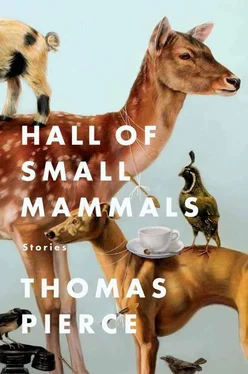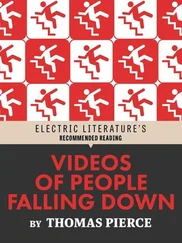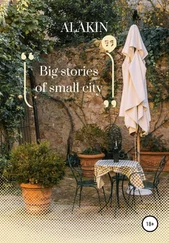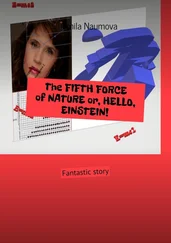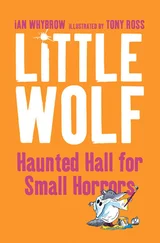Brooks isn’t sure what to say. He considers apologizing again.
“Actually, I lied,” the lump says. “I did call the police. They’ll be here, like, any minute. You’re going to jail.”
“Okay,” Brooks says, hand on the door. “Okay, I’m going.”
• • •
When Mary climbs down from the fridge, part of her just wants to leave and forget the tape. But she can’t do that. Brooks could be hurt upstairs. He could lose his way. He could trap himself in the linen closet and, in the dark, lose himself entirely.
Until her brother’s accident, Mary never gave much thought to the idea that personalities may be not only malleable but also divisible from the self. There has to be more to us than memories and quirks that can get smashed away so easily. This raises questions of accountability. What part of her is accountable for her decisions if all that stands between Mary being Mary and not someone else is a simple bump on the head?
Wandering down the hall in search of her brother, she finds a room with a computer on a mahogany desk and a leather chair on a clear plastic mat over the carpet. Wynn’s camera is in the chair, and in a metal tray beside the computer she finds a stack of small gray tapes. She can’t sort through them here. She’ll just have to take them all with her. She dumps out a bag of tangled cables, connectors, and start-up discs and loads the tapes into the bag. Then she adds the camera, just in case.
The hallway is quiet. Brooks is upstairs, somewhere — and the dogs? At the bottom of the stairwell she hears their nails. “Get out, Brooks,” she yells, and runs back the way she came, down the hall, past the grandfather clock and the pantry, into the kitchen, all of it so familiar now. She goes out the back door and runs out into the yard, the sunlight on her face, a stultifying whiteness. One day she will forget everything, and there will be nothing left of her except… This. Whatever This is. Total erasure, maybe.
She wanders around the perimeter of the house, searching for any sign of Brooks up in the windows. She sees a popped-out screen in the bushes — but no Brooks. On the front porch she leans into a narrow window beside the door with her hands cupped around her eyes. Through the thin white curtain she can barely make out a table in the foyer, a painting on the wall above that, and the base of the wide staircase. She rings the doorbell three times, hears it echo in the house. She is about to abandon the porch when, through the window, she sees feet on the stairs, then knees, then a torso. Brooks is striding down the stairwell like he owns the place.
The dogs follow him, no longer vicious at all, their heavy dumb tongues lolling over sharp, crooked teeth. Her brother has tamed the beasts. The dead bolt clicks open, and there he is, framed in the doorway: her big brother.
• • •
The dog bite isn’t deep enough to warrant a trip to the emergency room. “No more stitches,” he says. “Please.” Back at Mary’s, he takes a hot shower and lets the water trickle over his wound. Blood swirls around the drain. He towels off and wraps his ankle with gauze and then falls into a long nap on top of the covers. When he wakes up again, it’s dark out. He does his exercises at the foot of the bed and checks his email.
His mother has sent more pictures of the frogs. He scrolls through them: big-eyed blobs in the white snow, their neon-blue eggs like a thousand eyes under the freezing water. The final photo is of his mother and Cora crouching. Seeing his mother this happy in such a bleak landscape makes him smile.
He prints the picture to show his sister and heads downstairs. In the den, the blinds are drawn and the television screen casts a blue light across all the furniture, the plush couch and ottoman, the wall of framed photographs from Mary’s semester abroad in Rome — her black-and-whites of the Colosseum, the Circus Maximus, so many gardens, basilicas, crumbling stone baths. On the den floor stacks of gray tapes surround a video camera tethered to the television by a long cord.
Brooks sits down cross-legged and brings the camera into his lap. He can hear Mary in the kitchen, pots rattling, a dinner being prepared. The tapes all look the same. He picks one and pops it into the camera. When he pushes play, he keeps his finger on the button, just in case he’s presented with something no brother wants to see.
Two lines squiggle across the screen, and then a patio appears, a concrete space bright with sunlight. The camera is bouncy in someone’s hand. Two kids are on the ground, dyeing Easter eggs in red Dixie cups. The boy, maybe twelve years old, gives an egg to his younger sister. Holding it between two fingers, she dips it in the cup.
“Hey, didn’t know you were awake,” Mary says, striding into the room. When she sees what he’s watching she sighs and sits down beside him on the floor. They stare up at the television together. It’s been years, Brooks thinks, since he last saw this tape, but it’s all coming back to him now: their dye-stained fingertips, Easter eggs buried in the pine straw, the smell of the azalea bushes, his mother lounging in the yard with her Bible and People magazines.
“Seems like yesterday that was us,” Mary says.
The little girl on the screen knocks over the cup, and colored water spills all over her dress, the blue dye splashed up across her chest. She faces the camera bewildered, looking for help or reassurance maybe, and begins to cry.
“We shouldn’t be watching this,” Mary says, and grabs the camera from Brooks’s lap. “It’s wrong. Do you think I should try and return all this stuff? I feel awful about it. I guess I could leave it all on the doorstep.”
As she’s saying this, a woman Brooks doesn’t recognize rushes onto the screen with a handful of paper towels for the little girl’s dress, and only then does he fully understand that this isn’t their patio or their Easter or their mother. This isn’t their childhood at all, and it never was. “Stop clinging to the Old Brooks,” Dr. Groom likes to say. “And guess what? You’ll still be you.”
He looks over at Mary, her finger poised on the Stop button. But she doesn’t press Stop. She doesn’t pull the cable from the camera or gather the tapes back into the crinkling bag either. She is watching the boy, on screen, as he holds up a perfect egg and then runs out of the frame. The little girl crashes into her mother’s lap and cries into her shoulder. The scene ends and cuts to another. The kids are off searching for the eggs — in tree limbs, desk drawers, mulch beds, and, improbably, under a doormat. “Not there,” Mary says aloud. “I mean, really.”
When that video ends, the room is dark, and they are quiet. Brooks waits a few seconds before sliding another tape to her across the floor under his hand. Mary’s eyes dart up his arm and to his face, his ears and nose and forehead and scalp, her expression so serious he wonders if she’s really allowing herself to see him for the first time since the accident. He mushrooms out his upper lip, imitating her pity smile, and she rolls her eyes.
Then she loads the next tape.
Thank you to all the editors and staffs at the magazines and journals who gave many of these stories a first home: Ralph Eubanks, Roger Hodge, Laura Isaacman, David Leavitt, Cressida Leyshon, Paul Reyes, Evelyn Rogers, Randy Rosenthal, Deborah Treisman, Allison Wright, and more. A special thanks to Mike Curtis for many years of encouragement and advice.
To my teachers. At Wofford College: John Lane, Deno Trakas, Mark and Kerry Ferguson, Mark Byrnes, Ellen Goldey, Bernie Dunlap, Paige West (by way of Columbia University), Larry McGehee, and so many others. To the MFA faculty at UVA — Chris Tilghman, John Casey, and Ann Beattie — for every bit of guidance, for every note, for letting us invade your homes. Thank you to my fellow workshoppers: I’ve included you here with my teachers for a reason.
Читать дальше
